大学英语(全新版)第一册电子教案
- 格式:doc
- 大小:41.00 KB
- 文档页数:16
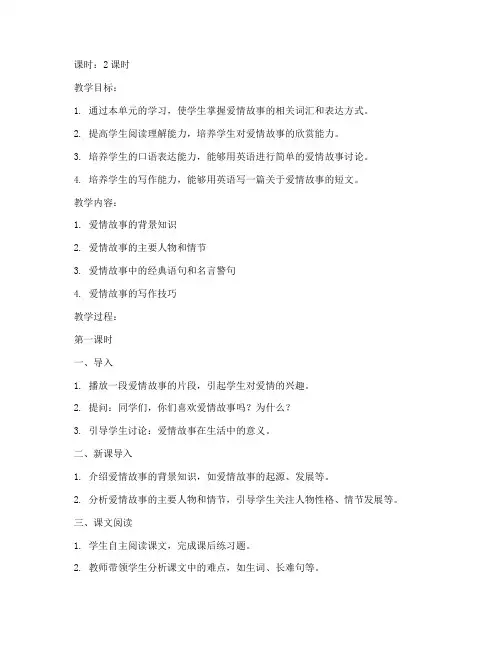
课时:2课时教学目标:1. 通过本单元的学习,使学生掌握爱情故事的相关词汇和表达方式。
2. 提高学生阅读理解能力,培养学生对爱情故事的欣赏能力。
3. 培养学生的口语表达能力,能够用英语进行简单的爱情故事讨论。
4. 培养学生的写作能力,能够用英语写一篇关于爱情故事的短文。
教学内容:1. 爱情故事的背景知识2. 爱情故事的主要人物和情节3. 爱情故事中的经典语句和名言警句4. 爱情故事的写作技巧教学过程:第一课时一、导入1. 播放一段爱情故事的片段,引起学生对爱情的兴趣。
2. 提问:同学们,你们喜欢爱情故事吗?为什么?3. 引导学生讨论:爱情故事在生活中的意义。
二、新课导入1. 介绍爱情故事的背景知识,如爱情故事的起源、发展等。
2. 分析爱情故事的主要人物和情节,引导学生关注人物性格、情节发展等。
三、课文阅读1. 学生自主阅读课文,完成课后练习题。
2. 教师带领学生分析课文中的难点,如生词、长难句等。
3. 学生分组讨论课文内容,分享自己的理解。
四、课堂活动1. 学生分组进行角色扮演,模拟爱情故事中的对话。
2. 教师点评学生的表演,指出优点和不足。
第二课时一、复习导入1. 复习上一节课的内容,检查学生对爱情故事的了解程度。
2. 引导学生总结爱情故事中的经典语句和名言警句。
二、课文阅读1. 学生自主阅读课文,完成课后练习题。
2. 教师带领学生分析课文中的难点,如生词、长难句等。
3. 学生分组讨论课文内容,分享自己的理解。
三、写作训练1. 教师讲解爱情故事的写作技巧,如人物塑造、情节安排等。
2. 学生根据所学内容,用英语写一篇关于爱情故事的短文。
3. 学生互评作文,教师点评学生的写作水平。
四、总结与拓展1. 总结本单元的学习内容,强调爱情故事在大学英语学习中的重要性。
2. 拓展:推荐一些优秀的爱情故事书籍和电影,供学生课后阅读和观看。
教学评价:1. 学生在课堂活动中的参与度,如角色扮演、讨论等。
2. 学生对爱情故事的阅读理解能力,如课后练习题的完成情况。
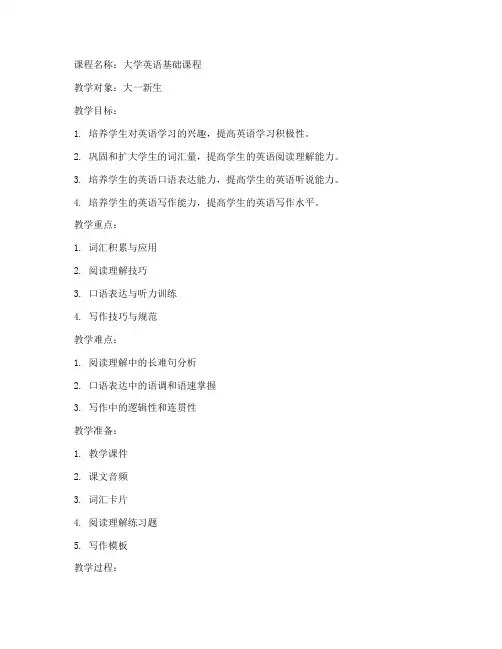
课程名称:大学英语基础课程教学对象:大一新生教学目标:1. 培养学生对英语学习的兴趣,提高英语学习积极性。
2. 巩固和扩大学生的词汇量,提高学生的英语阅读理解能力。
3. 培养学生的英语口语表达能力,提高学生的英语听说能力。
4. 培养学生的英语写作能力,提高学生的英语写作水平。
教学重点:1. 词汇积累与应用2. 阅读理解技巧3. 口语表达与听力训练4. 写作技巧与规范教学难点:1. 阅读理解中的长难句分析2. 口语表达中的语调和语速掌握3. 写作中的逻辑性和连贯性教学准备:1. 教学课件2. 课文音频3. 词汇卡片4. 阅读理解练习题5. 写作模板教学过程:一、导入(5分钟)1. 教师简要介绍本节课的教学目标和教学内容。
2. 通过提问或游戏等方式,激发学生的学习兴趣。
二、词汇学习(15分钟)1. 教师带领学生复习上一节课所学的词汇,并进行拓展。
2. 利用词汇卡片,让学生分组进行词汇接龙游戏,巩固词汇记忆。
三、阅读理解(20分钟)1. 教师播放课文音频,让学生初步了解文章内容。
2. 分组讨论,分析文章中的长难句,并总结段落大意。
3. 教师讲解阅读理解技巧,如关键词、主题句等。
4. 学生完成阅读理解练习题,教师进行讲解和点评。
四、口语表达与听力训练(20分钟)1. 教师选取一篇简单的对话或短文,让学生跟读,并尝试模仿。
2. 学生分组进行口语练习,教师巡回指导。
3. 教师播放听力材料,让学生进行听力训练,并总结听力技巧。
五、写作技巧与规范(15分钟)1. 教师讲解写作技巧,如开头、结尾、过渡等。
2. 学生根据教师提供的写作模板,完成一篇短文。
3. 教师点评学生的写作,并提出改进建议。
六、总结与作业布置(5分钟)1. 教师对本节课的教学内容进行总结,强调重点和难点。
2. 布置课后作业,如阅读课文、背诵词汇、完成写作练习等。
教学反思:1. 本节课通过多种教学手段,激发学生的学习兴趣,提高学生的英语学习积极性。
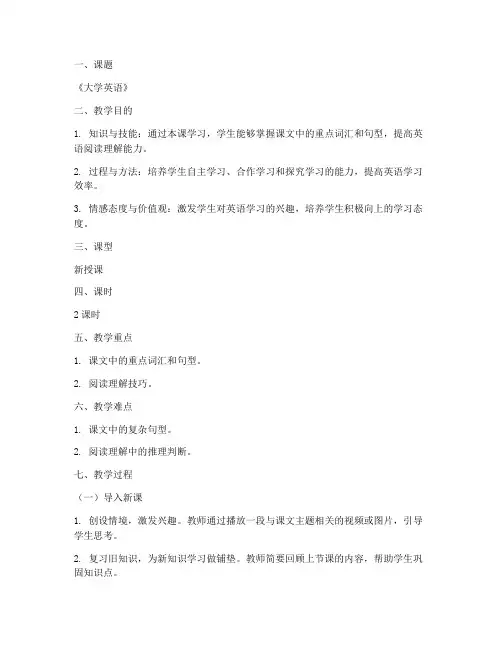
一、课题《大学英语》二、教学目的1. 知识与技能:通过本课学习,学生能够掌握课文中的重点词汇和句型,提高英语阅读理解能力。
2. 过程与方法:培养学生自主学习、合作学习和探究学习的能力,提高英语学习效率。
3. 情感态度与价值观:激发学生对英语学习的兴趣,培养学生积极向上的学习态度。
三、课型新授课四、课时2课时五、教学重点1. 课文中的重点词汇和句型。
2. 阅读理解技巧。
六、教学难点1. 课文中的复杂句型。
2. 阅读理解中的推理判断。
七、教学过程(一)导入新课1. 创设情境,激发兴趣。
教师通过播放一段与课文主题相关的视频或图片,引导学生思考。
2. 复习旧知识,为新知识学习做铺垫。
教师简要回顾上节课的内容,帮助学生巩固知识点。
(二)讲授新课1. 词汇讲解:教师讲解课文中的重点词汇,如:concentrate on、make progress、in the long run等,并引导学生进行例句练习。
2. 句型讲解:教师分析课文中的复杂句型,如:定语从句、状语从句等,并指导学生进行仿写练习。
3. 阅读理解:教师带领学生分析课文,引导学生运用阅读理解技巧,如:略读、寻读、精读等,提高阅读速度和理解能力。
(三)巩固练习1. 词汇练习:教师设计一些与课文内容相关的词汇练习,如:填空、选择题等,帮助学生巩固所学词汇。
2. 句型练习:教师设计一些与课文内容相关的句型练习,如:改写句子、翻译句子等,帮助学生巩固所学句型。
3. 阅读理解练习:教师设计一些与课文内容相关的阅读理解练习,如:判断正误、回答问题等,提高学生的阅读理解能力。
(四)归纳小结1. 教师对本节课所学内容进行总结,强调重点和难点。
2. 学生分享学习心得,提出自己的疑问。
(五)作业布置1. 复习课文,掌握重点词汇和句型。
2. 预习下一节课的内容。
八、板书设计《大学英语》一、重点词汇1. concentrate on2. make progress3. in the long run二、重点句型1. The more you practice, the better you will become.2. It is important to keep a positive attitude towards learning.三、阅读理解技巧1. 略读2. 寻读3. 精读九、教具1. 电脑2. 投影仪3. 课件4. 练习题通过本节课的学习,学生能够掌握《大学英语》课本中的重点词汇和句型,提高英语阅读理解能力,为今后的英语学习打下坚实的基础。
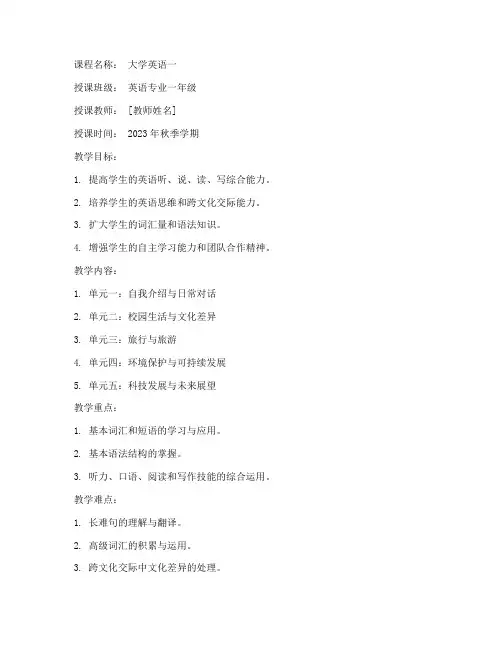
课程名称:大学英语一授课班级:英语专业一年级授课教师: [教师姓名]授课时间: 2023年秋季学期教学目标:1. 提高学生的英语听、说、读、写综合能力。
2. 培养学生的英语思维和跨文化交际能力。
3. 扩大学生的词汇量和语法知识。
4. 增强学生的自主学习能力和团队合作精神。
教学内容:1. 单元一:自我介绍与日常对话2. 单元二:校园生活与文化差异3. 单元三:旅行与旅游4. 单元四:环境保护与可持续发展5. 单元五:科技发展与未来展望教学重点:1. 基本词汇和短语的学习与应用。
2. 基本语法结构的掌握。
3. 听力、口语、阅读和写作技能的综合运用。
教学难点:1. 长难句的理解与翻译。
2. 高级词汇的积累与运用。
3. 跨文化交际中文化差异的处理。
教学过程:第一周:单元一 - 自我介绍与日常对话一、导入1. 课堂活动:自我介绍,让学生熟悉彼此。
2. 引导学生讨论英语国家文化中自我介绍的重要性。
二、新课导入1. 介绍本单元的主题:自我介绍与日常对话。
2. 分享一些常用的自我介绍和日常对话的词汇和短语。
三、词汇学习1. 教授本单元的核心词汇,如:introduce, hobby, interesting, etc.2. 通过游戏和练习,让学生熟练运用这些词汇。
四、语法讲解1. 介绍一般现在时和一般过去时的用法。
2. 通过例句和练习,让学生掌握语法结构。
五、听力练习1. 播放与自我介绍相关的听力材料。
2. 让学生回答问题,检查听力理解。
六、口语练习1. 分组进行自我介绍和日常对话的练习。
2. 教师进行指导和评价。
七、小结1. 回顾本节课的学习内容。
2. 布置课后作业。
第二周:单元二 - 校园生活与文化差异一、复习上节课内容1. 回顾自我介绍和日常对话的词汇和语法。
2. 让学生进行口语练习。
二、新课导入1. 介绍本单元的主题:校园生活与文化差异。
2. 分享一些与校园生活相关的词汇和短语。
三、词汇学习1. 教授本单元的核心词汇,如:campus, study, club, etc.2. 通过游戏和练习,让学生熟练运用这些词汇。
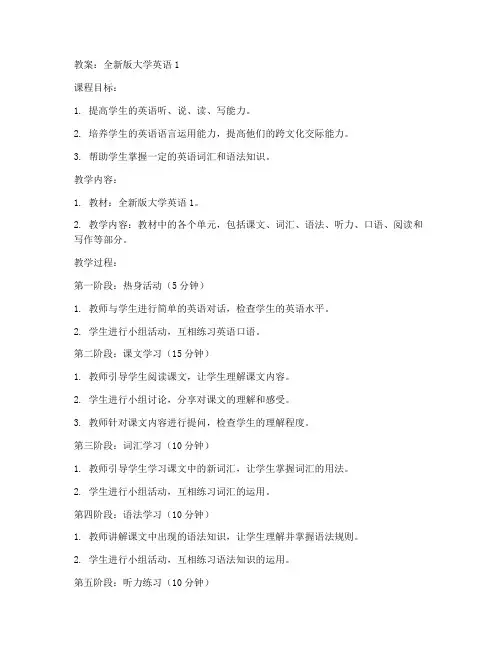
教案:全新版大学英语1课程目标:1. 提高学生的英语听、说、读、写能力。
2. 培养学生的英语语言运用能力,提高他们的跨文化交际能力。
3. 帮助学生掌握一定的英语词汇和语法知识。
教学内容:1. 教材:全新版大学英语1。
2. 教学内容:教材中的各个单元,包括课文、词汇、语法、听力、口语、阅读和写作等部分。
教学过程:第一阶段:热身活动(5分钟)1. 教师与学生进行简单的英语对话,检查学生的英语水平。
2. 学生进行小组活动,互相练习英语口语。
第二阶段:课文学习(15分钟)1. 教师引导学生阅读课文,让学生理解课文内容。
2. 学生进行小组讨论,分享对课文的理解和感受。
3. 教师针对课文内容进行提问,检查学生的理解程度。
第三阶段:词汇学习(10分钟)1. 教师引导学生学习课文中的新词汇,让学生掌握词汇的用法。
2. 学生进行小组活动,互相练习词汇的运用。
第四阶段:语法学习(10分钟)1. 教师讲解课文中出现的语法知识,让学生理解并掌握语法规则。
2. 学生进行小组活动,互相练习语法知识的运用。
第五阶段:听力练习(10分钟)1. 教师播放课文中的听力材料,让学生听懂并理解听力内容。
2. 学生进行小组活动,互相练习听力技巧。
第六阶段:口语练习(10分钟)1. 教师引导学生进行口语练习,让学生能够流利地表达自己的观点。
2. 学生进行小组活动,互相练习口语表达。
第七阶段:阅读练习(10分钟)1. 教师引导学生进行阅读练习,让学生能够快速阅读并理解文章内容。
2. 学生进行小组活动,互相分享阅读心得。
第八阶段:写作练习(10分钟)1. 教师引导学生进行写作练习,让学生能够准确地表达自己的观点。
2. 学生进行小组活动,互相评改写作作品。
第九阶段:总结与反馈(5分钟)1. 教师对本次课程进行总结,强调重点知识点。
2. 学生进行自我评价,反馈学习效果。
教学评价:1. 课堂参与度:学生参与课堂活动的积极程度。
2. 口语表达:学生口语表达的流利程度和准确性。
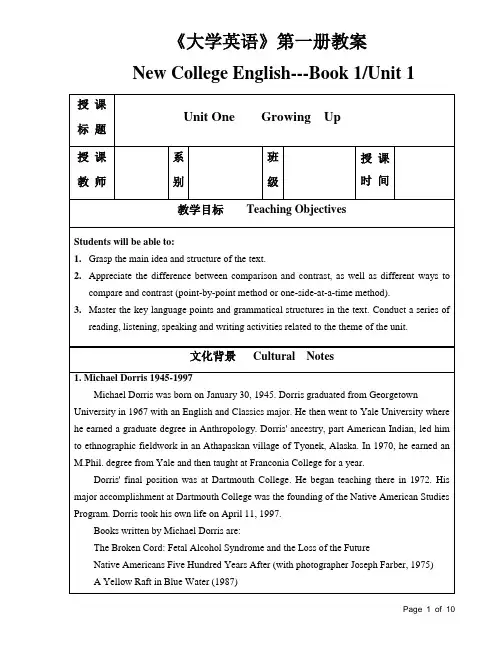
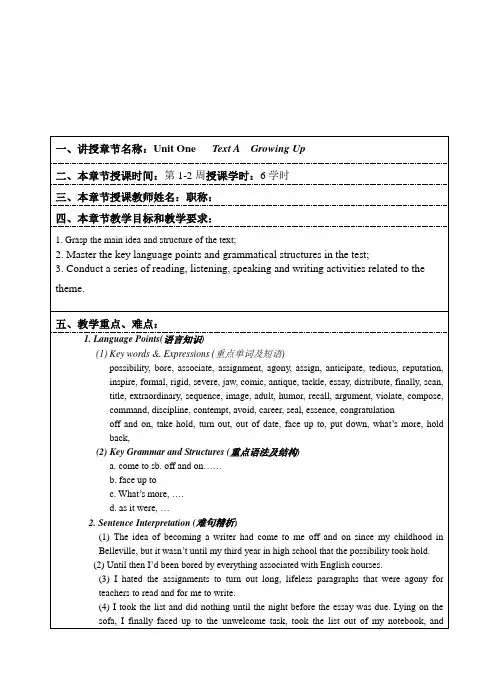
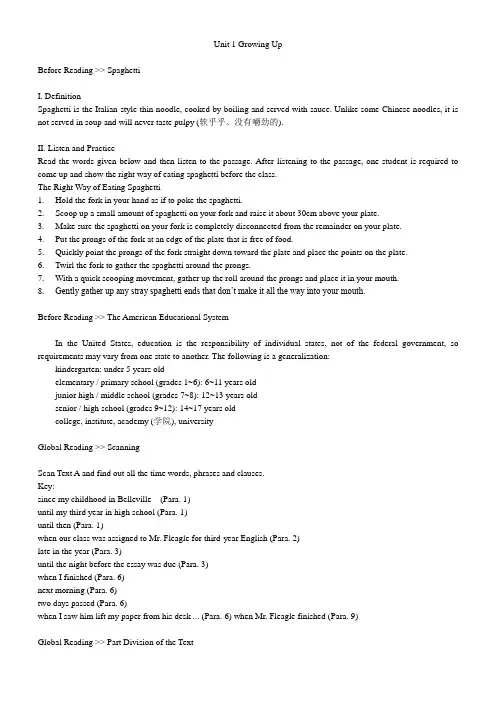
Unit 1 Growing UpBefore Reading >> SpaghettiI. DefinitionSpaghetti is the Italian-style thin noodle, cooked by boiling and served with sauce. Unlike some Chinese noodles, it is not served in soup and will never taste pulpy (软乎乎、没有嚼劲的).II. Listen and PracticeRead the words given below and then listen to the passage. After listening to the passage, one student is required to come up and show the right way of eating spaghetti before the class.The Right Way of Eating Spaghetti1. Hold the fork in your hand as if to poke the spaghetti.2. Scoop up a small amount of spaghetti on your fork and raise it about 30cm above your plate.3. Make sure the spaghetti on your fork is completely disconnected from the remainder on your plate.4. Put the prongs of the fork at an edge of the plate that is free of food.5. Quickly point the prongs of the fork straight down toward the plate and place the points on the plate.6. Twirl the fork to gather the spaghetti around the prongs.7. With a quick scooping movement, gather up the roll around the prongs and place it in your mouth.8. Gently gather up any stray spaghetti ends that don’t make it all the way into your mouth.Before Reading >> The American Educational SystemIn the United States, education is the responsibility of individual states, not of the federal government, so requirements may vary from one state to another. The following is a generalization:- kindergarten: under 5 years old- elementary / primary school (grades 1~6): 6~11 years old- junior high / middle school (grades 7~8): 12~13 years old- senior / high school (grades 9~12): 14~17 years old- college, institute, academy (学院), universityGlobal Reading >> ScanningScan Text A and find out all the time words, phrases and clauses.Key:since my childhood in Belleville (Para. 1)until my third year in high school (Para. 1)until then (Para. 1)when our class was assigned to Mr. Fleagle for third-year English (Para. 2)late in the year (Para. 3)until the night before the essay was due (Para. 3)when I finished (Para. 6)next morning (Para. 6)two days passed (Para. 6)when I saw him lift my paper from his desk ... (Para. 6) when Mr. Fleagle finished (Para. 9)Global Reading >> Part Division of the TextParts Para(s) Main Ideas1 1~2 Baker was bored by everything associated with English courses, including his new English teacher.2 3~5 Baker found himself attracted by one particular topic and wrote about it for his own enjoyment.3 6~9 The experience of writing the essay helped Baker discover his talent for writing and realize what he wished to do in life.Global Reading >> Further UnderstandingI. For Part 1 True or False1. Baker had never thought of becoming a writer until he was in the eleventh grade. (F)(As a child in Belleville, he had thought of becoming a writer from time to time.)2. Teachers found it painful to read st udents’ long and lifeless essays. (T)3. Before Mr. Fleagle became the English teacher for Baker’s class, the English course had been interesting. (F) (From the words “another cheerless year” we can see the English course had been quite boring.)4. In Bake r’s opinion, Mr. Fleagle was really a formal, rigid and out-of-date teacher only because of Fleagle’s manner of speaking. (F)(Besides the manner of speaking, Fleagle’s appearance and dress also showed that he was a dull and rigid teacher.)II. For Part 2 Multiple ChoiceChoose the best answer to complete the sentence.1. At first, Baker thought Mr. Fleagle’s English course was ___________. (B)A. interestingB. dullC. hopefulD. attractive2. In Baker’s opinion, the title of the composition “What I Did on My Summer V acation” was _________. (D)A. dullB. unfruitfulC. difficultD. foolish and dull3. Baker liked to write a composition with the title “The Art of Eating Spaghetti” because __________. (D)A. neither Baker nor Doris had ever eaten spaghetti beforeB. Baker and Doris argued about it at a supperC. spaghetti was from Italy and quite new thenD. it reminded him of the pleasure of that evening4. Which of the following statements is TRUE? _________ (A)A. Y ou’ll not write a good composition until you like the topic.B. When Baker wrote the essay, he thought his teacher would like it.C. Mr. Fleagle had liked Baker’s compositions before.D. Baker succeeded in writing two compositions.III. For Part 3 Questions and Answers1. Do you think Baker would write another essay if he had enough time? Why?2. What was Baker prepared for when he found all the papers had been given back but his?3. Whose essay did Mr. Fleagle read to the class? How did the class respond?4. Which paragrap h in this part gives readers the impression that Baker’s essay was very good?5. Why did Baker feel so delighted?Detailed ReadingI. Difficult Sentences1. Until then I’d been bored by everything associated with English courses. (Para. 1)What can we infer from this sentence? (Up to then, Baker had had no interest in things related to English courses.)2. I hated the assignments to turn out long, lifeless paragraphs that were agony for teachers to read and for me to write. (Para. 1)Paraphrase the sentence.(I found it painful to write long, boring essays as required by teachers; neither did teachers enjoy what I wrote.)3. another cheerless year in that most tedious of subjects (Para. 2)What can we learn from this phrase?(We can know from this phras e that before Mr. Fleagle became Baker’s English teacher, all English courses were dull.)4. I prepared for an unfruitful year with Mr. Fleagle and for a long time was not disappointed. (Para. 3)What does the author really mean when he says “I ... was not disappointed”?(He means that his expectation was right that Mr. Fleagle’s lessons were dull.)5. I took the list home and did nothing until the night before the essay was due. Lying on the sofa, I finally faced up to the unwelcome task, took the list out of my notebook, and scanned it. (Para. 3)1) What can we infer from these sentences?(Baker was unwilling to write his essay.)2) List phrases to support your inference.(did nothing until … the essay was due; faced up to the unwelcome task.)6. This title produced an extraordinary sequence of mental images. (Para. 4)Paraphrase the sentence and translate it into Chinese.(At the sight of the title I saw an unusual series of pictures in my mind’s eye. 这个题目在我脑海里唤起了一连串不同寻常的图像。
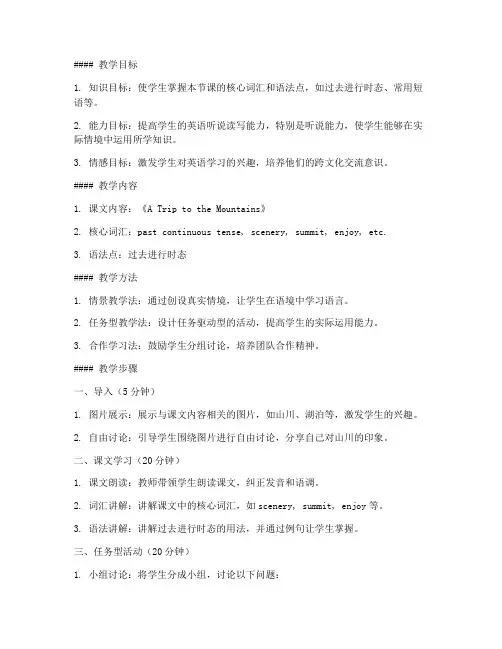
#### 教学目标1. 知识目标:使学生掌握本节课的核心词汇和语法点,如过去进行时态、常用短语等。
2. 能力目标:提高学生的英语听说读写能力,特别是听说能力,使学生能够在实际情境中运用所学知识。
3. 情感目标:激发学生对英语学习的兴趣,培养他们的跨文化交流意识。
#### 教学内容1. 课文内容:《A Trip to the Mountains》2. 核心词汇:past continuous tense, scenery, summit, enjoy, etc.3. 语法点:过去进行时态#### 教学方法1. 情景教学法:通过创设真实情境,让学生在语境中学习语言。
2. 任务型教学法:设计任务驱动型的活动,提高学生的实际运用能力。
3. 合作学习法:鼓励学生分组讨论,培养团队合作精神。
#### 教学步骤一、导入(5分钟)1. 图片展示:展示与课文内容相关的图片,如山川、湖泊等,激发学生的兴趣。
2. 自由讨论:引导学生围绕图片进行自由讨论,分享自己对山川的印象。
二、课文学习(20分钟)1. 课文朗读:教师带领学生朗读课文,纠正发音和语调。
2. 词汇讲解:讲解课文中的核心词汇,如scenery, summit, enjoy等。
3. 语法讲解:讲解过去进行时态的用法,并通过例句让学生掌握。
三、任务型活动(20分钟)1. 小组讨论:将学生分成小组,讨论以下问题:- 你最喜欢的风景是什么?- 你曾经去过哪些风景优美的地方?- 你认为旅行有什么意义?2. 角色扮演:每组选出一个代表,进行角色扮演,模拟旅行过程中的对话。
四、巩固练习(10分钟)1. 填空练习:根据课文内容,完成填空题。
2. 翻译练习:将课文中的句子翻译成中文。
五、总结与反思(5分钟)1. 教师总结:对本节课的内容进行总结,强调重点和难点。
2. 学生反思:引导学生反思自己在学习过程中的收获和不足。
#### 教学反思本节课通过创设真实情境、任务型活动和合作学习,提高了学生的英语听说读写能力。
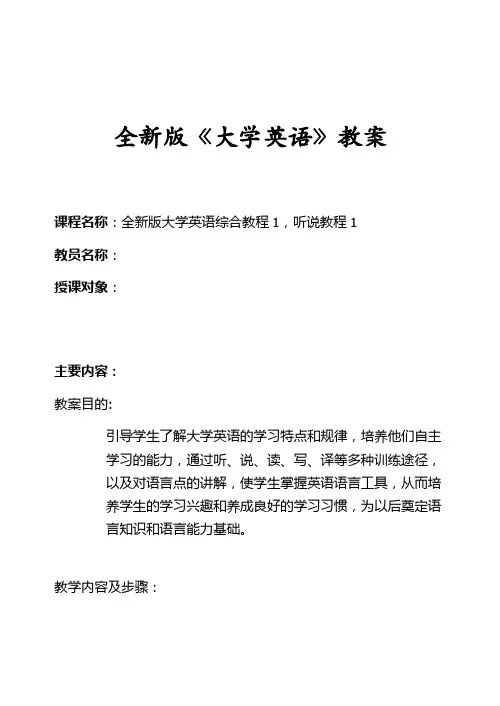
全新版《大学英语》教案课程名称:全新版大学英语综合教程1,听说教程1教员名称:授课对象:主要内容:教案目的:引导学生了解大学英语的学习特点和规律,培养他们自主学习的能力,通过听、说、读、写、译等多种训练途径,以及对语言点的讲解,使学生掌握英语语言工具,从而培养学生的学习兴趣和养成良好的学习习惯,为以后奠定语言知识和语言能力基础。
教学内容及步骤:课文讲解:包括Text A课文背景、结构划分、阅读训练、语言点讲解、写作手法分析等。
习题讲解:解决学生提出的习题中遇到的突出问题。
小组讨论:课文讲解及习题结束后学生小组讨论与本单元主题相关的问题及话题,加深对主题的理解,为课后写作提供素材。
听力训练: 听说教程每单元的交际功能、听力策略以及听力任务部分。
作文互评:教师辅助下的同伴互助学习,修改讨论作文教学方法:讲授法、讨论法、听说法、同伴互助法教学手段:黑板、粉笔、手机、扩音宝教学时间分配:每单元6个学时Period 1教师辅助下的同伴作文互评(前一单元作文);课文讲解(新单元)Period 2课文讲解Period 3课文讲解Period 4课文讲解;检查习题完成情况;习题讲解;布置讨论准备任务Period 5习题讲解;小组讨论;布置写作任务Period 6 听力训练;布置预习任务Useful English Learning Resources:Magazines: English Language Learning, College English, English Salon, English Weekly, The world of English, English Digest, Overseas EnglishNewspaper: 21st Century, China DailyWebsites: (英语比萨园地); (听力快车); (普特英语听力); (英文写作网); (旺旺英语); (中国日报); (英国卫报) (华盛顿邮报)注:听力训练采用的教材为全新版大学英语听说教程2,每次一个单元,由于时间有限只做PartA及Part B 的Listening Tasks部分。
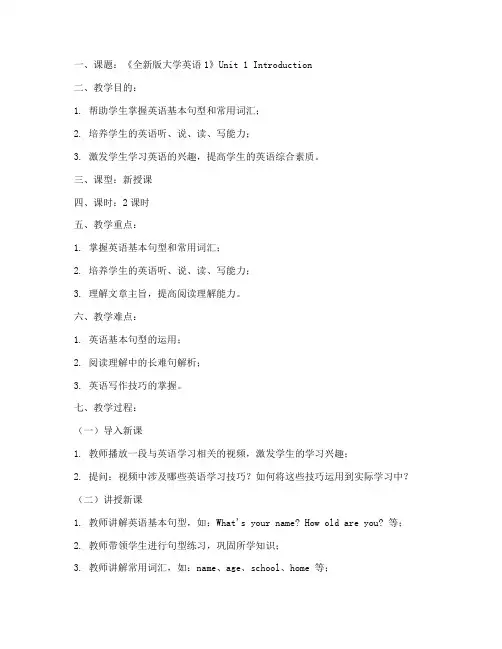
一、课题:《全新版大学英语1》Unit 1 Introduction二、教学目的:1. 帮助学生掌握英语基本句型和常用词汇;2. 培养学生的英语听、说、读、写能力;3. 激发学生学习英语的兴趣,提高学生的英语综合素质。
三、课型:新授课四、课时:2课时五、教学重点:1. 掌握英语基本句型和常用词汇;2. 培养学生的英语听、说、读、写能力;3. 理解文章主旨,提高阅读理解能力。
六、教学难点:1. 英语基本句型的运用;2. 阅读理解中的长难句解析;3. 英语写作技巧的掌握。
七、教学过程:(一)导入新课1. 教师播放一段与英语学习相关的视频,激发学生的学习兴趣;2. 提问:视频中涉及哪些英语学习技巧?如何将这些技巧运用到实际学习中?(二)讲授新课1. 教师讲解英语基本句型,如:What's your name? How old are you? 等;2. 教师带领学生进行句型练习,巩固所学知识;3. 教师讲解常用词汇,如:name、age、school、home 等;4. 教师引导学生进行词汇练习,提高词汇运用能力;5. 教师带领学生阅读课文,讲解文章主旨和段落大意;6. 教师解析阅读理解中的长难句,帮助学生提高阅读理解能力;7. 教师讲解英语写作技巧,如:如何组织文章结构、如何运用过渡词等。
(三)巩固练习1. 教师组织学生进行句型练习,巩固所学知识;2. 教师组织学生进行词汇练习,提高词汇运用能力;3. 教师组织学生进行阅读理解练习,提高阅读理解能力;4. 教师组织学生进行英语写作练习,提高写作技巧。
(四)归纳小结1. 教师总结本节课所学内容,强调重点和难点;2. 教师提醒学生在课后进行复习,巩固所学知识。
(五)作业安排1. 复习本节课所学英语基本句型和常用词汇;2. 阅读课文,完成课后练习;3. 按照所学写作技巧,写一篇英语短文。
八、板书设计:全新版大学英语1 Unit 1 Introduction一、英语基本句型:1. What's your name?2. How old are you?3. Where do you come from?4. What do you do?二、常用词汇:1. name2. age3. school4. home三、阅读理解:1. 理解文章主旨;2. 解析长难句;3. 提高阅读理解能力。
一、课题1. 课题名称:Getting to Know You2. 课型:新授课二、教学目的1. 知识目标:(1)掌握课文中的生词和短语;(2)理解课文内容,掌握文章主旨大意;(3)了解英语国家文化背景知识。
2. 能力目标:(1)提高学生的阅读理解能力;(2)培养学生英语口语表达能力;(3)提高学生的听说读写综合运用能力。
3. 情感目标:(1)激发学生学习英语的兴趣;(2)培养学生的团队协作精神;(3)增强学生的自信心。
三、教学重点1. 理解课文内容,掌握文章主旨大意;2. 掌握课文中的生词和短语;3. 培养学生的口语表达能力。
四、教学难点1. 理解课文中的复杂句型;2. 掌握课文中的文化背景知识;3. 学生的口语表达能力。
五、教学过程1. 导入新课(1)教师简要介绍本节课的学习内容,激发学生的学习兴趣;(2)播放一段与课文主题相关的视频,引导学生思考问题。
2. 讲授新课(1)阅读课文,引导学生理解文章主旨大意;(2)分析课文中的复杂句型,讲解语法知识;(3)讲解课文中的文化背景知识,提高学生的文化素养。
3. 巩固练习(1)让学生分组进行角色扮演,模拟课文中的场景;(2)教师设置问题,引导学生进行讨论和回答;(3)学生自评和互评,提高口语表达能力。
4. 归纳小结(1)教师对本节课所学内容进行总结;(2)强调本节课的重点和难点;(3)布置课后作业。
六、板书设计1. 课题:Getting to Know You2. 生词和短语:get to know, introduce, exchange, etc.3. 语法知识:复杂句型、时态、语态等4. 文化背景知识:西方国家的交友习惯、礼仪等七、教具1. 多媒体课件2. 视频资料3. 课本八、作业布置1. 阅读课文,理解文章主旨大意;2. 复习课文中的生词和短语;3. 模拟课文中的场景,进行角色扮演;4. 查找与课文主题相关的文化背景知识。
大学英语(全新版)第一册电子教案(全新版)第一册电子教案Unit Eight TravelI.Teaching Objectives:Students will be able to :1.understand the main idea and structure of the text;2.appreciate the fluid and sensual writing style;3.grasp the key language points and grammatical structuresin the text;4.conduct a series of reading, listening, speaking andwriting activities.II.Text Analysis:The text is beautifully written. That’s why we arrange a post-reading activity simply for students to share favorite sentences with each other. It may be true that the functional use of English will dominate in their life, but it pays to expose them to the aesthetic side of English.There is an abundance of sensory impressions in the essay.All of our five senses are appealed to here. We hear the songs of birds, insects and children. We feel the coolness of drinks and the night. We smell the sweetness in the air.We observe the wonderful sights and graceful movements on the river, on the lake and in the jungle. We taste the food.Not only does the author move effortlessly from one sensory impression to another, but she also handles the changes in time and place in a smooth, seamless way. In part II, she first writes about wh at happened “later that night”, then moved back to narrate the incidents of “ that afternoon”, finally back to“now”. she was sitting on a tree stump on the river bank near a palm-thatch village in Part I, then she sat in a camp in Part II, went on a journey away from the river into the jungle and finally returned to riverside village in Part III.All through these movements there is overall coherence.There is an echo—“It would be worth it”, “The Napo River: it is not out of the way. It is in the way.”III.Cultural Notes:1.Amazon (river): river in northern South America, largelyin Brazil, ranked as the largest in the world in terms ofwatershed area, number of tributaries, and volume ofwater discharged. Measuring 6,400 km (4,000 mi) fromsource to mouth, it is second in length only to the Nileamong the rivers of the world. With its hundreds oftributaries, the Amazon drains a territory of more than 6sq km (2.3 million sq mi), roughly half of which is in Brazil; the rest is in Peru, Ecuador, Bolivia, and Venezuela. It is estimated that the Amazon discharges between 34 million and 121 million liters (9 million and32 million galleons) of water per second and deposits adaily average of 3 million tons of sediment near its mouth.The annual outflow from the river accounts for one-fifth of all the fresh water that drains into the oceans of the world. The outpouring of water and sediment is so vast that the salt content and color of the Atlantic Ocean are altered for a distance of about 320 km (about 200 mi) from the mouth of the river.2.Ecuador:republic in northwestern South America,bounded by Colombia on the north, by Peru on the east and south, and by the Pacific Ocean on the west. The country also includes the Galapagos Islands in the Pacific, about 965 km(about 600 mi) west of the mainland.Ecuador straddles the equator and has an area of 272,045 sq km (105,037 sq mi). Quito is the country’s capital.Ecuador has a diverse population composed of people of European, Native American, and African descent. The majority are Mestizos, individuals of mixed European andAmerican ancestry. Most of the Native Americans live in poverty in the highlands region, where a small elite of European descent controls most of the land and wealth.Ecuador was a Spanish colony until 1822, when independence forces won a decisive victory over Spain.Ecuador has had a democratically elected government since 1979, but historically the government has alternated between civilian rule and military dictatorship. Most political conflicts involved squabbles among groups within the upper classes who controlled the nation’s wealth.3. Andes:the principal mountains of South America andone of the greatest mountain systems of the world. The Andes include some of the world’s highest peaks. Mor e than 50 of them soar higher than 6,100 m above sea level. Only the Himalayas of south central Asia are higher. The lofty plateaus and high mountain valleys of the Andes contain some of the highest permanent human settlements in the world. The Andes are the longest system of high mountain ranges on earth. They extend for more than 8000 km in a narrow belt along the western edge of the South American continent, from theTierra del Fuego in the extreme south. Along almost itsentire length, the Andes rise abruptly from the Pacificcoast. The mountains reach into seven countries.Venezuela, Colombia, Ecuador, Peru, Bolivia, Chile andArgentina./doc/e12476046.html,nguage Study:1. in the heart ofin the center of 在…中心e.g. Apartments in the heart of the city are too expensive.The metropolitan museum is located in the heart of the city.2. hushvi. be or become silent 安静下来,变得安静e.g. Having cried for half an hour, the little boy hushed.Hush, you’ll wake up the baby.3. illuminevt. shine light on 照亮,照明e.g. The sky was illumined by flashes from the volcano.My balloon was illumined by the sun that was just rising.now...now...at one time...at another time... 忽而…忽而…e.g. The junior officer who came into the room looked nervous; his eyes swiveled quickly, now this way, now that, as if he were scanning the room for danger.Now soft, now loud, now cheerful, now sorrowful, the voice of Uncle Tom told as much of the tale as his words did.5. in (all)silencewith (complete) absence of sound or noise (完全)不出声地e.g. The kids were listening to the music in the classroom, in complete silence.The soldiers stood in the glaring sin as the minutes ticked away, in all silence.6. tanglevt. catch in or as in a net, trap; mix together or intertwine in a confused mass 使卷入,使陷入;e.g. I have the sort of hair thattangles easily.The bushes were tangles with vines.7. trailextend over a surface 蔓延,伸展e.g. Roses trailing over the walls made her garden so beautiful.The strawberry is a trailing plant belonging to the rose family.8. loopvt. form or bend into a loop 使成环状e.g. She looped the scarf round her neck and went out into the cold night air.The man looped the rope over the wooden pole.9. mutevt. reduce or stop the sound of 减弱(或停止)…的声音e.g. At the sight of their teacher walking into the classroom, they muted their voices.The strings are muted throughout the closing bars of the symphony.10. dissolvev. fade away, disappear 消散,消失e.g. The characteristics of gases vary widely. Some gases are transparent, some dissolve in water, and some have a strong The panda ate the bamboo rapidly and then dissolved into the shadows.11. loosevt. untie, release 解开,放开e.g. The hunter loosed the arrow without warning.It’s not a healthy habit to loose your belt when you are full.12. slumpvi. sit or fall down heavily 重重地坐下(或倒下)e.g. Kennedy had been hit and slumped to the floor of the automobile.He slumped into a chair, completely exhausted.13. be dying to do sth. /for sth.desire (to do) sth. eagerly 非常想做某事(或得到某物)e.g. She was dying to tell them the good news that she had won first prize in the speech contest.Having worked in the sun for four hours, I was dying for a cup of tea.get one's hands oncatch hold of, find or get (sth.) 抓到,得到e.g. I wish I could get my hands on a copy of Harry Potter.The book’s here somewhere, but I don’t seem to be able to get my hands on it just now.15. take apartseparate into its different parts 拆开,分开e.g. When I was young, my parents never blamed me for taking my toys apart.When my computer broke down, I took it apart, found what was wrong, and put the whole thing together again.16. spectaculara. extraordinary; very attractive or impressive 与众不同的;引人入胜的,壮观的e.g. The British Museum, one of the most spectacular museums in the world, is renowned for its extensive and diverse collection.The Sun’s movement can produce spectacular sunrises and sunsets under the right atmospheric conditions.fringen. the outer edge or limit of sth. 边缘,边界e.g. Near the outer fringes of the solar system lies dark blue Neptune, a gas giant that probably has no true surface.With the new suburbs springing up on the fringes of the city, the urban life has changed completely.18. in detailwith specifics 详细地e.g. The police asked the victim of the robbery to describe what happened to him in detail.To maintain their place in the media world, newspapers try hard to cover news events in greater detail than television and radio do.19. opaquen. not clear enough to allow light through 不透光的,不透明的e.g. Milk is often stored in opaque containers to prevent vitamins from being destroyed by light.Usually transparent, glass can nonetheless also be opaque.20. smearmake (sth.) dirty;spread (a thick liquid, etc.) over a surface 弄脏;涂抹e.g. Don't smear the glasses; I've just polished them.My sister smeared herself with suntan oil as she sat by the swimming pool.21. flockn. a group of certain animals (动物)群in flocks a. in groups 成群地e.g. Penguins are gregarious birds and are found in flocks even at sea.Many small birds feed in flocks.22. dartvi. move suddenly and rapidly 迅疾地飞(奔)e.g. The boy darted behind the sofa as his father stormed into the living room.The lizard darted out its tongue at a fly.23. reputevt. believe, consider 认为,称为e.g. She is widely reputed to be 25 years younger than herMaradona is reputed to earn over two million pounds a year.24. stripn. a long narrow region of land or body of water; a long narrow piece 狭长的地域(或水域);条,带e.g. About 30 million people live along the Californian coastal strip.Our pay slips used to be printed on long strips of paper.25. paddlev. 用桨划(船)e.g. Canoes can be paddled by one or more persons.One of the things you will be taught at the training school is how to paddle a canoe.26. out of sightno longer in view 在视野以外,看不见e.g. The woman didn't go into the house until her daughter drove away and slowly faded out of sight.When out of sight of land, ancient seafarers used to derive clues about their location by observing the position of the sun.27. stripeda. 有条纹的e.g. She looked slim in her green and white striped shirt.The room was decorated with striped wallpaper.28. clattervi. move quickly and noisily; (cause to) make continuous loudnoises by hitting hard objects against each other 喧闹地移动;(使)咔嗒咔嗒地响e.g. She dropped the bucket and it went clattering down the stairs.His boots clattered on the stone floor, attracting our attention.29. fussvi. bustle about; give too much attention to small and unimportant matters 忙乱;大惊小怪e.g. As soon as they saw the manager the waiters began fussing around the tables.My wife was fussing over the food we were going to take. 30. slapshoot; hit with something flat 弹射;拍击e.g. Catherine responded to the man's attempt by slapping him.The pinch hitter slapped the ball.31. out of rangetoo far away to be reached, seen or heard 在射程外的,够不到的e.g. We thought that we were out of range of their rifles until the bullets started kicking up the dust in front of us.It was said the flying object was well out of range of their rockets.32. thrashvi. move wildly or violently 猛烈摆动,翻腾e.g. The swimmers were thrashing about in the water.The dog thrashed around trying to break free.33. heapn. an untidy pile of something 一堆,大量e.g. He left his books in a heap on the floor.There is heaps of time before I take the examination.34. glidevi. move quickly and silently with ease; fly through the air without power 轻快无声地走;滑翔e.g. At the sight of me she glided across the dance floor to greet me.The waiters glided between tightly packed tables bearing trays of pasta.35. swarmvi. move in a crowd 成群地移动,蜂拥e.g. A dark cloud of bees came swarming out of the hive.Panic-stricken, people swarmed to the shops, buying up everything in sight.36. hopvi. (of a person) jump on one foot; (of a bird or other animals) jump with two or all feet at once(人)单足跳,跳跃;(鸟和其他动物)齐足跳e.g. The birds hopped about and pecked the earth briskly, looking for seeds and insects.He hopped down the steps like an athlete.。
课程名称:大学英语综合教程1授课时间:第1课时教学目标:1. 让学生掌握本课的基本词汇和语法知识。
2. 培养学生的阅读理解能力、听说能力和写作能力。
3. 培养学生的跨文化交际意识。
教学内容:1. 词汇:掌握本课出现的生词和短语。
2. 语法:复习和巩固一般现在时、一般过去时、一般将来时等时态。
3. 阅读理解:通过阅读短文,提高学生的阅读速度和理解能力。
4. 听力理解:通过听力练习,提高学生的听力水平。
5. 口语表达:通过课堂讨论和角色扮演,提高学生的口语表达能力。
6. 写作:完成一篇与课文主题相关的短文。
教学过程:一、导入新课1. 通过提问学生关于英语学习的看法,激发学生的学习兴趣。
2. 引导学生回顾上一节课所学内容,为新课做好铺垫。
二、词汇教学1. 展示本课生词和短语,让学生自主朗读并解释其意思。
2. 通过例句和游戏,让学生熟练运用本课词汇。
三、语法教学1. 复习和巩固一般现在时、一般过去时、一般将来时等时态。
2. 通过例句和练习,让学生掌握时态的正确运用。
四、阅读理解1. 让学生阅读短文,并回答问题,检验学生的阅读理解能力。
2. 引导学生分析短文的结构和写作手法。
五、听力理解1. 播放听力材料,让学生听并回答问题。
2. 分析听力材料,提高学生的听力水平。
六、口语表达1. 通过课堂讨论,让学生发表自己的观点。
2. 通过角色扮演,提高学生的口语表达能力。
七、写作1. 分析写作要求,让学生明确写作方向。
2. 通过小组讨论,让学生互相交流写作思路。
3. 指导学生完成短文写作。
八、归纳小结1. 总结本课所学内容,帮助学生巩固知识。
2. 引导学生思考如何将所学知识应用到实际生活中。
九、作业布置1. 完成本课的课后练习。
2. 预习下一节课的内容。
教学评价:1. 通过课堂提问、练习和作业,评价学生的学习效果。
2. 关注学生的口语表达和写作能力,给予及时指导和反馈。
教学反思:1. 根据学生的学习情况,调整教学策略,提高教学效果。
New College English (Second Edition) Integrated Course 1 全新版大学英语(第二版)综合教程第1册Unit 1 Growing UpText A Writing for MyselfI。
Teaching ObjectivesStudents will be able to:1。
grasp the main idea (the essence of writing is to write what one enjoys writing)and structure of Text A (narration in chronological sequence);2. appreciate the narrative skills demonstrated in Text A (selection of details,repetition, coherence);3。
master the key language points and learn how to use them in context;4。
understand the cultural background related to the content;5. express themselves more freely on the theme of Growing Up after doing a series of theme—related reading,listening, speaking and writing activities;6. write a letter of congratulations in an appropriate way.II。
Teaching Focus1。
Talk with the students about the different ways of learning English in the middle school and college;2。
Unit 1 Growing UpObjectivesStudents will be able to:1)grasp the main idea and the structure of the text ( narration in chronological sequence)2)appreciate the narrative skills demonstrated in the text3)master the key language points and grammatical structures in the text4)conduct a series of reading, listening, speaking and writing activities related to the theme ofthe unit.Pre-reading Tasks1. T asks Ss the following question on the song Beautiful Boy:What does Lennon think of growing up?2. The art of eating spaghetti3. Pair workA pair of students talk about their most unforgettable experience of growing up with each other.Russell Baker is very good at selecting details (see Part IV Writing Strategy) to prove his point. For example, in Para. 2 he creates an unfavorable image of Mr. Fleagle by describing his “formal, rigid and hopelessly out-of-date” eyeglasses, hairstyle, clothes, jaw, nose, and manner of speaking.What’s more, Russell Baker employs repletion not only to make it easy for readers to follow what he is saying, but also to impress them more deeply. For example, in Para. 2, there are 9 prim’s or primly’s in as few as 3 sentences! Thus readers will have in their mind a vivid picture of what Mr. Fleagle looked like. Another example of such repetition can be found in Para. 5. Count how many I wanted’s there are in this paragraph (there are 5!). They help to emphasize Russell Baker’s strong desire to write for himself.On the other hand, where this stylistic device is not justified, Baker is also expert in avoiding repetition by employing synonymous words and phrases. Here are some examples:a.dull, lifeless, cheerless, tediousb.turn out, write, compose, put downc.recapture, relived.topic, titleCultural Notes1.Grade schools in the US.: It is necessary to have some knowledge of grade schools in the U.S.because Ss have to realize that “the third year in high school” (para. 1) equals “the eleventh grade” (para.9). U.S. students generally go through elementary schools (kindergarten to 5th or 6th grade), middle schools (grades 6-8) or junior highs schools (grades 7-9), and high schools (grades 9-12 or 10-12).2.What American teachers wear in school: Nowadays, people in the U. S. love to dress causally.Even among those companies with a rigid dress code some now allow employees not to wear suits on Fridays. U.S. teachers were fairly formal clothes to school, but not necessarily suits and ties. Bow ties are considered even more old-fashioned than ties.3.Spaghetti and the proper way of eating it: Spaghetti is the Italian-style thin noodle, cooked bboiling and served with sauce. Usually you would put a fork into a plate of spaghetti, turn the fork several times so that spaghetti will wind around the fork, then place the fork into your mouth. It’s impolite to suck.Language study1.off and on: adv.In an intermittent manner: slept off and on last night.2.take hold: to start to have an effectThe fever was beginning to take hold.3.associate: To connect or join together; combine; To connect in the mind or imaginationassociate one thing with anotherWe associate China with the Greet Wall.What do you associate with such a heavy snow?4. turn out: a. to shut off: turned out the lights.b. to arrive or assemble, as for a public event or entertainment:A large group of protesters have turned out.c. To produce, as by a manufacturing process; make: an assembly line turning out cars.d. To be found to be, as after experience or trial:The rookie turned out to be the best hitter on the team.e. To end up; result: The cake turned out beautifully.f. To equip; outfit: troops that were turned out beautifully.g. Informal To get out of bed.h. To evict; expel: The tenants were turned out.5. agony: The suffering of intense physical or mental pain.His last agony was over. 他临死的挣扎已经过去了。
全新版大学英语1教案教案标题:全新版大学英语1教案教案目标:1. 帮助学生掌握英语基本语法、词汇和句型;2. 培养学生听、说、读、写的综合语言能力;3. 提高学生的跨文化交际能力;4. 激发学生学习英语的兴趣和积极性。
教学内容:1. Unit 1: Greetings and Introductions2. Unit 2: Personal Information3. Unit 3: Daily Activities4. Unit 4: Hobbies and Interests5. Unit 5: Shopping6. Unit 6: Travel and Transportation7. Unit 7: Food and Drinks8. Unit 8: Health and Fitness教学步骤:Step 1: Warm-up (5 minutes)- Greet the students and engage them in a short conversation to create a positive learning atmosphere.- Review previously learned vocabulary and expressions related to the current unit.Step 2: Introduction (10 minutes)- Present the new vocabulary and expressions related to the unit using visual aids, real-life examples, and context.- Introduce the grammar points and sentence structures that will be covered in the unit.Step 3: Listening and Speaking Practice (15 minutes)- Play an audio recording or provide a dialogue for the students to listen to and practice their listening comprehension.- Conduct pair or group activities to encourage students to practice speaking using the newly introduced vocabulary and expressions.Step 4: Reading and Writing Practice (15 minutes)- Assign reading materials, such as short passages or articles, for students to read and comprehend.- Provide writing prompts or assignments that require students to use the target language in written form.Step 5: Grammar Focus (10 minutes)- Explain the grammar rules and usage related to the unit's focus.- Provide examples and exercises for students to practice applying the grammar rules.Step 6: Cultural Awareness (10 minutes)- Introduce cultural aspects related to the unit's theme, such as customs, traditions, or etiquette.- Encourage students to discuss and share their own cultural experiences or differences.Step 7: Review and Assessment (10 minutes)- Review the key points covered in the lesson and check students' understanding through a brief quiz or discussion.- Assign homework or additional practice exercises to reinforce the lesson's content.Step 8: Conclusion and Wrap-up (5 minutes)- Recap the main points covered in the lesson.- Encourage students to ask questions or seek clarification on any remaining doubts.教学资源:1. 教材:全新版大学英语1教材2. 多媒体设备:投影仪、音频设备3. 教学辅助工具:图片、实物、活动卡片、课件等教学评估:1. 观察学生在听、说、读、写方面的表现;2. 批改作业和练习册的答案;3. 进行小组或个人演讲、口试等形式的评估;4. 组织课堂互动活动,观察学生的参与度和表现。
大学英语(全新版)第一册电子教案Unit Eight TravelI.Teaching Objectives:Students will be able to :1.understand the main idea and structure of the text;2.appreciate the fluid and sensual writing style;3.grasp the key language points and grammatical structuresin the text;4.conduct a series of reading, listening, speaking andwriting activities.II.Text Analysis:The text is beautifully written. That’s why we arrange a post-reading activity simply for students to share favorite sentences with each other. It may be true that the functional use of English will dominate in their life, but it pays to expose them to the aesthetic side of English.There is an abundance of sensory impressions in the essay.All of our five senses are appealed to here. We hear the songs of birds, insects and children. We feel the coolness of drinks and the night. We smell the sweetness in the air.We observe the wonderful sights and graceful movements on the river, on the lake and in the jungle. We taste thedelicious village food.Not only does the author move effortlessly from one sensory impression to another, but she also handles the changes in time and place in a smooth, seamless way. In part II, she first writes about what happened “later that night”, then moved back to narrate the incidents of “ that afternoon”, finally back to “now”. she was sitting on a tree stump on the river bank near a palm-thatch village in Part I, then she sat in a camp in Part II, went on a journey away from the river into the jungle and finally returned to riverside village in Part III.All through these movements there is overall coherence.There is an echo—“It would be worth it”, “The Napo River: it is not out of the way. It is in the way.”III.Cultural Notes:1.Amazon (river): river in northern South America, largelyin Brazil, ranked as the largest in the world in terms ofwatershed area, number of tributaries, and volume ofwater discharged. Measuring 6,400 km (4,000 mi) fromsource to mouth, it is second in length only to the Nileamong the rivers of the world. With its hundreds oftributaries, the Amazon drains a territory of more than 6million sq km (2.3 million sq mi), roughly half of which is in Brazil; the rest is in Peru, Ecuador, Bolivia, and Venezuela. It is estimated that the Amazon discharges between 34 million and 121 million liters (9 million and32 million galleons) of water per second and deposits adaily average of 3 million tons of sediment near its mouth.The annual outflow from the river accounts for one-fifth of all the fresh water that drains into the oceans of the world. The outpouring of water and sediment is so vast that the salt content and color of the Atlantic Ocean are altered for a distance of about 320 km (about 200 mi) from the mouth of the river.2.Ecuador:republic in northwestern South America,bounded by Colombia on the north, by Peru on the east and south, and by the Pacific Ocean on the west. The country also includes the Galapagos Islands in the Pacific, about 965 km (about 600 mi) west of the mainland.Ecuador straddles the equator and has an area of 272,045 sq km (105,037 sq mi). Quito is the country’s capital.Ecuador has a diverse population composed of people of European, Native American, and African descent. The majority are Mestizos, individuals of mixed European andNative American ancestry. Most of the Native Americans live in poverty in the highlands region, where a small elite of European descent controls most of the land and wealth.Ecuador was a Spanish colony until 1822, when independence forces won a decisive victory over Spain.Ecuador has had a democratically elected government since 1979, but historically the government has alternated between civilian rule and military dictatorship. Most political conflicts involved squabbles among groups within the upper classes who controlled the nation’s wealth.3. Andes:the principal mountains of South America andone of the greatest mountain systems of the world. The Andes include some of the world’s highest peaks. More than 50 of them soar higher than 6,100 m above sea level. Only the Himalayas of south central Asia are higher. The lofty plateaus and high mountain valleys of the Andes contain some of the highest permanent human settlements in the world. The Andes are the longest system of high mountain ranges on earth. They extend for more than 8000 km in a narrow belt along the western edge of the South American continent, from thecoast of the Caribbean Sea in the north to the island ofTierra del Fuego in the extreme south. Along almost itsentire length, the Andes rise abruptly from the Pacificcoast. The mountains reach into seven countries.Venezuela, Colombia, Ecuador, Peru, Bolivia, Chile andArgentina.nguage Study:1. in the heart ofin the center of 在…中心e.g. Apartments in the heart of the city are too expensive.The metropolitan museum is located in the heart of the city.2. hushvi. be or become silent 安静下来,变得安静e.g. Having cried for half an hour, the little boy hushed.Hush, you’ll wake up the baby.3. illuminevt. shine light on 照亮,照明e.g. The sky was illumined by flashes from the volcano.My balloon was illumined by the sun that was just rising.4. now...now...at one time...at another time... 忽而…忽而…e.g. The junior officer who came into the room looked nervous; his eyes swiveled quickly, now this way, now that, as if he were scanning the room for danger.Now soft, now loud, now cheerful, now sorrowful, the voice of Uncle Tom told as much of the tale as his words did.5. in (all)silencewith (complete) absence of sound or noise (完全)不出声地 e.g. The kids were listening to the music in the classroom, in complete silence.The soldiers stood in the glaring sin as the minutes ticked away, in all silence.6. tanglevt. catch in or as in a net, trap; mix together or intertwine in a confused mass 使卷入,使陷入;e.g. I have the sort of hair that tangles easily.The bushes were tangles with vines.7. trailvi. extend over a surface 蔓延,伸展e.g. Roses trailing over the walls made her garden so beautiful.The strawberry is a trailing plant belonging to the rose family.8. loopvt. form or bend into a loop 使成环状e.g. She looped the scarf round her neck and went out into the cold night air.The man looped the rope over the wooden pole.9. mutevt. reduce or stop the sound of 减弱(或停止)…的声音e.g. At the sight of their teacher walking into the classroom, they muted their voices.The strings are muted throughout the closing bars of the symphony.10. dissolvev. fade away, disappear 消散,消失e.g. The characteristics of gases vary widely. Some gases are transparent, some dissolve in water, and some have a strongsmell.The panda ate the bamboo rapidly and then dissolved into the shadows.11. loosevt. untie, release 解开,放开e.g. The hunter loosed the arrow without warning.It’s not a healthy habit to loose your belt when you are full.12. slumpvi. sit or fall down heavily 重重地坐下(或倒下)e.g. Kennedy had been hit and slumped to the floor of the automobile.He slumped into a chair, completely exhausted.13. be dying to do sth. /for sth.desire (to do) sth. eagerly 非常想做某事(或得到某物)e.g. She was dying to tell them the good news that she had won first prize in the speech contest.Having worked in the sun for four hours, I was dying for a cup of tea.14. get one's hands oncatch hold of, find or get (sth.) 抓到,得到e.g. I wish I could get my hands on a copy of Harry Potter.The book’s here somewhere, but I don’t seem to be able to get my hands on it just now.15. take apartseparate into its different parts 拆开,分开e.g. When I was young, my parents never blamed me for taking my toys apart.When my computer broke down, I took it apart, found what was wrong, and put the whole thing together again.16. spectaculara. extraordinary; very attractive or impressive 与众不同的;引人入胜的,壮观的e.g. The British Museum, one of the most spectacular museums in the world, is renowned for its extensive and diverse collection.The Sun’s movement can produce spectacular sunrises and sunsets under the right atmospheric conditions.17. fringen. the outer edge or limit of sth. 边缘,边界e.g. Near the outer fringes of the solar system lies dark blue Neptune, a gas giant that probably has no true surface.With the new suburbs springing up on the fringes of the city, the urban life has changed completely.18. in detailwith specifics 详细地e.g. The police asked the victim of the robbery to describe what happened to him in detail.To maintain their place in the media world, newspapers try hard to cover news events in greater detail than television and radio do.19. opaquen. not clear enough to allow light through 不透光的,不透明的e.g. Milk is often stored in opaque containers to prevent vitamins from being destroyed by light.Usually transparent, glass can nonetheless also be opaque.20. smearvt. make (sth.) dirty;spread (a thick liquid, etc.) over a surface 弄脏;涂抹e.g. Don't smear the glasses; I've just polished them.My sister smeared herself with suntan oil as she sat by the swimming pool.21. flockn. a group of certain animals (动物)群in flocks a. in groups 成群地e.g. Penguins are gregarious birds and are found in flocks even at sea.Many small birds feed in flocks.22. dartvi. move suddenly and rapidly 迅疾地飞(奔)e.g. The boy darted behind the sofa as his father stormed into the living room.The lizard darted out its tongue at a fly.23. reputevt. believe, consider 认为,称为e.g. She is widely reputed to be 25 years younger than herhusband.Maradona is reputed to earn over two million pounds a year.24. stripn. a long narrow region of land or body of water; a long narrow piece 狭长的地域(或水域);条,带e.g. About 30 million people live along the Californian coastal strip.Our pay slips used to be printed on long strips of paper.25. paddlev. 用桨划(船)e.g. Canoes can be paddled by one or more persons.One of the things you will be taught at the training school is how to paddle a canoe.26. out of sightno longer in view 在视野以外,看不见e.g. The woman didn't go into the house until her daughter drove away and slowly faded out of sight.When out of sight of land, ancient seafarers used to derive clues about their location by observing the position of the sun.27. stripeda. 有条纹的e.g. She looked slim in her green and white striped shirt.The room was decorated with striped wallpaper.28. clattervi. move quickly and noisily; (cause to) make continuous loud noises by hitting hard objects against each other 喧闹地移动;(使)咔嗒咔嗒地响e.g. She dropped the bucket and it went clattering down the stairs.His boots clattered on the stone floor, attracting our attention.29. fussvi. bustle about; give too much attention to small and unimportant matters 忙乱;大惊小怪e.g. As soon as they saw the manager the waiters began fussing around the tables.My wife was fussing over the food we were going to take. 30. slapvt. shoot; hit with something flat 弹射;拍击e.g. Catherine responded to the man's attempt by slapping him.The pinch hitter slapped the ball.31. out of rangetoo far away to be reached, seen or heard 在射程外的,够不到的e.g. We thought that we were out of range of their rifles until the bullets started kicking up the dust in front of us.It was said the flying object was well out of range of their rockets.32. thrashvi. move wildly or violently 猛烈摆动,翻腾e.g. The swimmers were thrashing about in the water.The dog thrashed around trying to break free.33. heapn. an untidy pile of something 一堆,大量e.g. He left his books in a heap on the floor.There is heaps of time before I take the examination.34. glidevi. move quickly and silently with ease; fly through the air without power 轻快无声地走;滑翔e.g. At the sight of me she glided across the dance floor to greet me.The waiters glided between tightly packed tables bearing trays of pasta.35. swarmvi. move in a crowd 成群地移动,蜂拥e.g. A dark cloud of bees came swarming out of the hive.Panic-stricken, people swarmed to the shops, buying up everything in sight.36. hopvi. (of a person) jump on one foot; (of a bird or other animals) jump with two or all feet at once(人)单足跳,跳跃;(鸟和其他动物)齐足跳e.g. The birds hopped about and pecked the earth briskly, looking for seeds and insects.He hopped down the steps like an athlete.。